Are you feeling a bit scrambled when it comes to egg choices? From pasture-raised to free-range, cage-free, and organic, it can be very confusing when trying to figure out the best eggs to buy. What’s the difference? What’s the healthiest egg option? Whether you’re an eggs-pert or a newbie, let’s get cracking and dive into the most nutrient-rich egg options.
Get ready for some egg-cellent information – keep reading to learn more!
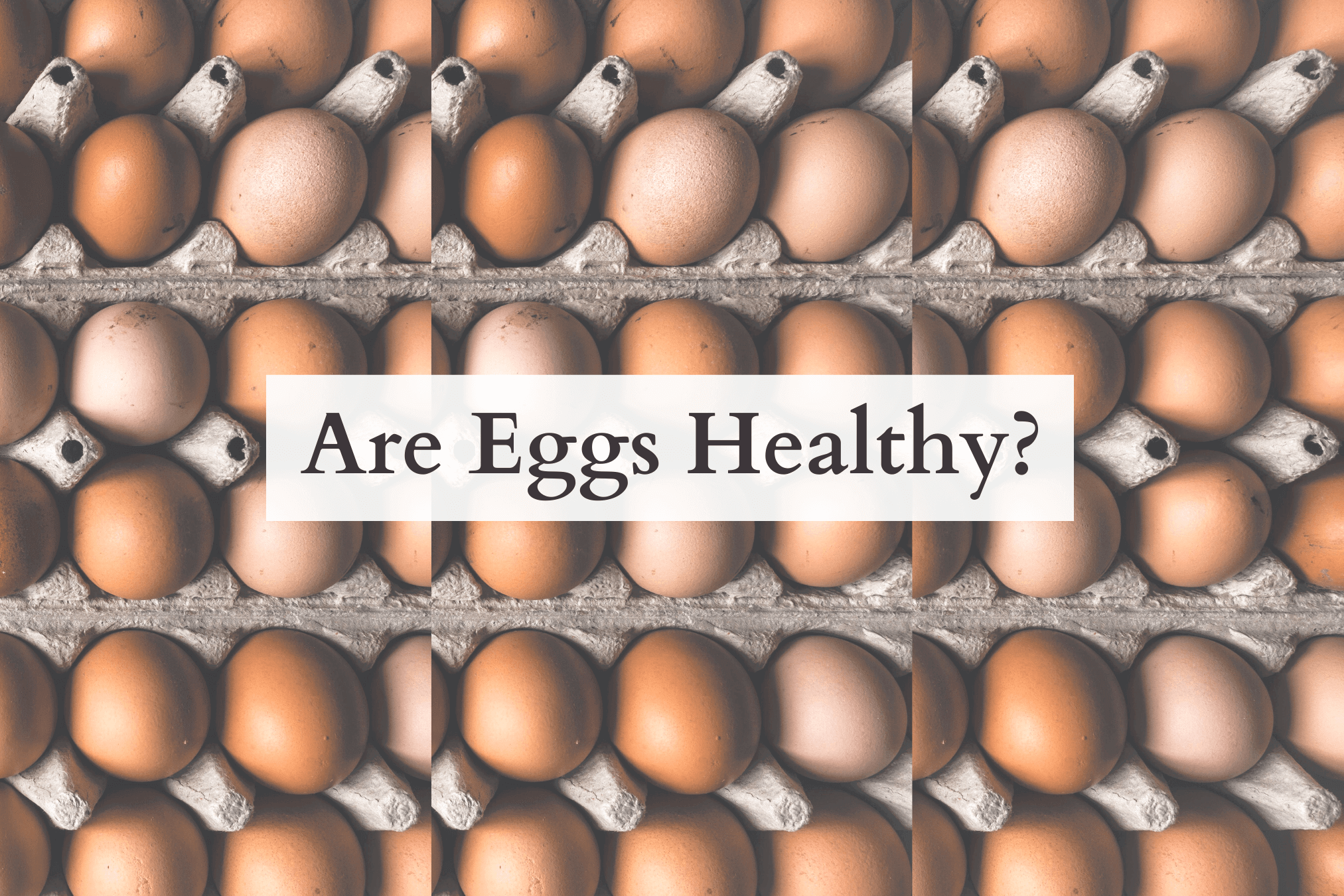
Note: This article contains affiliate links, meaning In On Around will make a small commission at no additional cost to you. This helps me maintain the site. As always, I value full transparency & only work with brands I love and trust.
Are Eggs Healthy?
Well, well, well, if it isn’t the age-old question: are eggs healthy or not? It’s a topic that’s been tossed around for years, with some people cracking down on eggs as cholesterol bombs while others insist that they’re a great source of protein and nutrients. So let’s dive into the potential pros and cons of eggs…
Egg Pros
- High Protein – Eggs are a rich source of high-quality protein (about 6 grams per egg), which is essential for building and repairing tissues in the body.
- Amino Acids – They contain all nine essential amino acids.
- Vitamins & Minerals – They contain essential vitamins and minerals such as vitamin A, vitamin B12, and selenium.
- Brain Health – Eating eggs can help improve brain function and boost cognitive performance due to their choline content.
- Satiety – Eggs can help increase feelings of fullness and reduce overall calorie intake, potentially leading to weight loss.
- Heart-Safe – Research suggests that moderate egg consumption may not increase the risk of heart disease and may even have a protective effect.
- Eye Health – Eggs are rich in lutein and zeaxanthin, which are antioxidants that can help protect the eyes from damage caused by harmful blue light and free radicals.
In fact, according to a large 2020 study that analyzed over 177,000 individuals from 50 countries, they did NOT find significant associations between egg consumption and blood lipids, death, or major cardiovascular events. [1] Eggs are in fact heart-healthy!
Eggs do NOT increase the risk of cardiovascular disease. [2]
Egg Cons
- Allergies – Some people may be allergic to eggs, which can cause mild to severe allergic reactions.
- Salmonella Risk – Eggs can sometimes be contaminated with bacteria such as Salmonella, which can cause foodborne illness.
- This risk is mitigated if the eggs are properly and fully cooked to an internal temperature of 160° F.
- Cooking Method – Eggs can be cooked in inflammatory oils that can increase inflammation and weight gain.
- This is more directly related to the oils used, not eggs. To learn more about healthy cooking oil options, check out: Seed Oils & Inflammatory Oils To Avoid While Cooking
Clearly, the pros far outweigh any potential cons. Eggs are very healthy and they’re a great way to start the day. As always, listen to your body and focus on a well-balanced diet. That being said, quality is key. Let’s dive into egg quality in more detail.
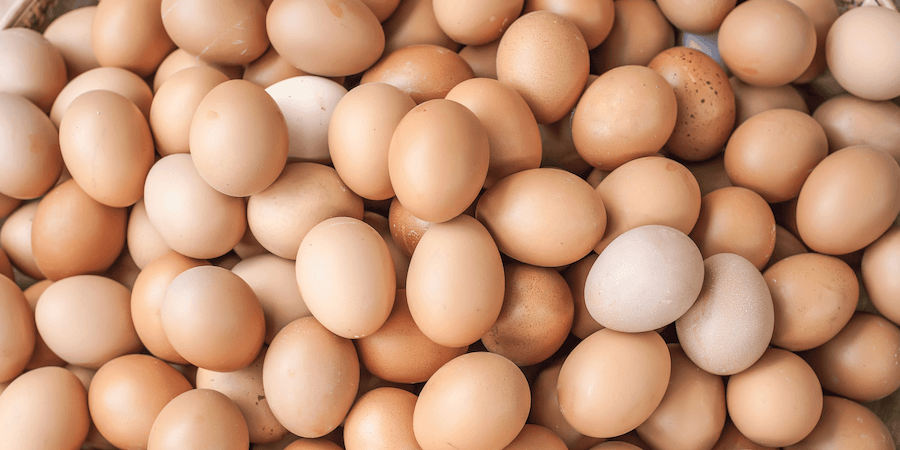
Eggs In The United States
Eggs sold in the United States are typically handled differently than in many other countries. In fact, in America, eggs are commonly washed and refrigerated to prevent the growth of Salmonella. The United States Department of Agriculture (USDA) requires farms that own 3,000+ laying hens to wash all of their eggs and store them under 45˚ F within 36 hours after the eggs are laid. [3] Many small farms will also choose to abide by this regulation. These egg-processing plants are inspected regularly by the USDA.
Contrary to the US, many other countries have implemented mandatory hen vaccination programs. Interestingly, egg shells are naturally porous but have a natural coating a hen applies to the egg when laid, called “bloom,” preventing bacteria from entering inside the egg. Because of this bloom, eggs don’t need to be refrigerated. They can usually stay on the counter for 2 weeks, then placed in the fridge for up to 3 months. Once eggs are refrigerated, keep them refrigerated, since condensation can lead to bacterial growth.
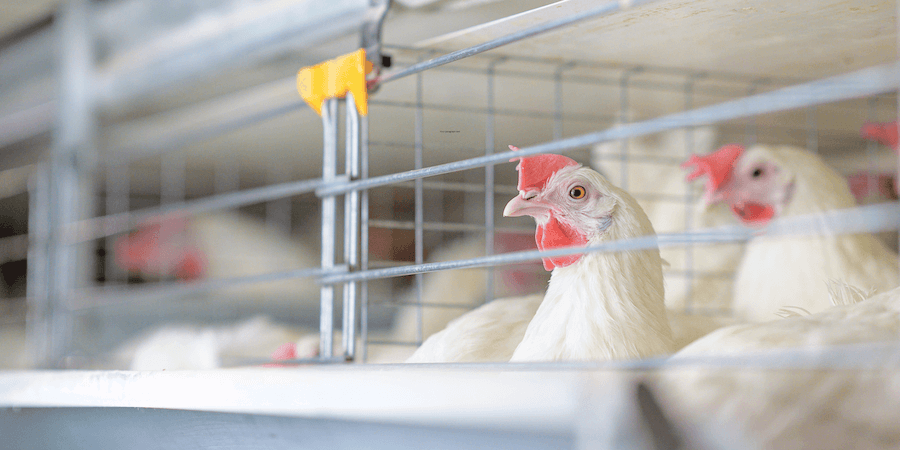
Conventional Egg Production
Conventional eggs come from chickens that are raised in cramped cages (known as “battery cages“) and are commonly given antibiotics and hormones to boost their egg production. The average battery-caged hen lives in about 67-70 square inches (like the size of a sheet of paper) for their ENTIRE lives. [4] It’s incredibly cruel and inhumane. They’re unable to move. Their bones and muscles breakdown and their feet are torn open from constant contact. [5]
About 66% of all laying hens in America are considered conventional eggs. [6]
Their bodies completely deteriorate and are oftentimes standing in rotting carcasses of other cage-mates. Oftentimes their wings and beaks are clipped too. The birds are so incredibly stressed and improperly fed that they sometimes will peck each other to death. They’re one of the most abused animals on Earth.
Although conventional eggs are more affordable and widely available in grocery stores, their conventional farming practices are not environmentally friendly or humane.
Added November 2023 from a follower: The ammonia is so powerful in chicken houses that workers must wear gas masks to enter and at the age of 18-24 months the chickens are culled and made into chicken nuggets and baby food – just what you want to feed your kids, right? The flesh of an animal that was tortured its whole life.
Choosing The Healthiest Eggs: Labeling Rules
When it comes to choosing eggs at the grocery store, navigating through the various labeling terms can be quite confusing. Terms like organic, cage-free, free-range, and pasture-raised are all commonly used, but what do they really mean for the health and quality of the eggs? Let’s explore the different labeling rules for eggs and what you need to know to make informed decisions when choosing the healthiest eggs for you and your family.
Required Labeling:
Eggs sold in the United States must include these four labels:
- Safe handling instructions
- Information on the size of the eggs
- A USDA-approved grade mark/shield (Grade AA, A, or B)
- Nutritional information
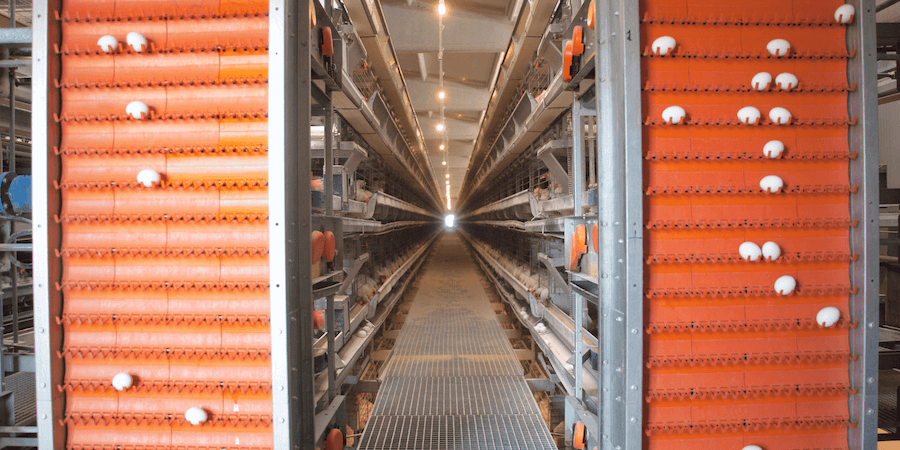
Voluntary Labeling:
Aside from the required labeling, there are a LOT of voluntary marketing terms used on egg cartons and packaging. If “free range” makes you think of happy, healthy chickens frolicking around outside, think again! This will surprise you. Let’s dive into each of the different terms.
1 – Cage-free
Verdict: AVOID
- Cage-free accounts for about 35% of eggs on the market [7]
- Unlike conventional egg manufacturing, cage-free chickens are not put into small cages. However – don’t be fooled by the marketing. They’re oftentimes tightly packed together indoors in a barn or large pen without access to the outside.
- There are no diet regulations around cage-free
- While the regulation says they must be “freely roaming” and have areas to scratch/perch/nest, they typically have less than 1 square foot to roam around (which is very small!)
- Cage-free eggs can actually result in even higher mortality, bone fracture, and disease rates. [8]
- Eggs from caged hens are 7.77 times more likely to carry Salmonella. [9]
Eggs from caged hens are 7.77 times more likely to carry Salmonella. [10]
2 – Free-Range
Verdict: AVOID
- Free-range eggs must follow the same rules as cage-free, but must have “continuous access to outdoors during their laying cycle.”
- A small door (a “pop hole”) in the large room could classify as “free-range” because they technically would have access to the outside… however, with thousands of birds packed inside, it would be uncommon for a bird to even get the chance to venture outdoors.
- If it’s Certified Humane free-range, then the hens must have at least six hours of outdoor access everyday with a minimum of 2 square feet per bird. This is a better standard.
3 – Pasture-raised
Verdict: SUPPORT – This is typically the highest standard available.
- Eggs from pasture-raised hens that are certified by Certified Humane or Animal Humane must have at least 108 square feet of pasture area with live vegetation that’s regularly rotated.
- These chickens have full outdoor access and they can freely roam, perch, forage, take dust baths, nest, and more.
- Dust-bathing also helps to prevent lice and other parasites
- They forage for their food, including munching on bugs, the way nature intended.
- Pasture-raised eggs are higher in nutrients like:
- Vitamin A
- Vitamin E
- Omega-3 fatty acids
- Folic acid
- Vitamin B12
- Vitamin D
- Beta-carotene
- They also have less cholesterol and fat
- They would also have access to a barn for protection from weather or predators, if needed
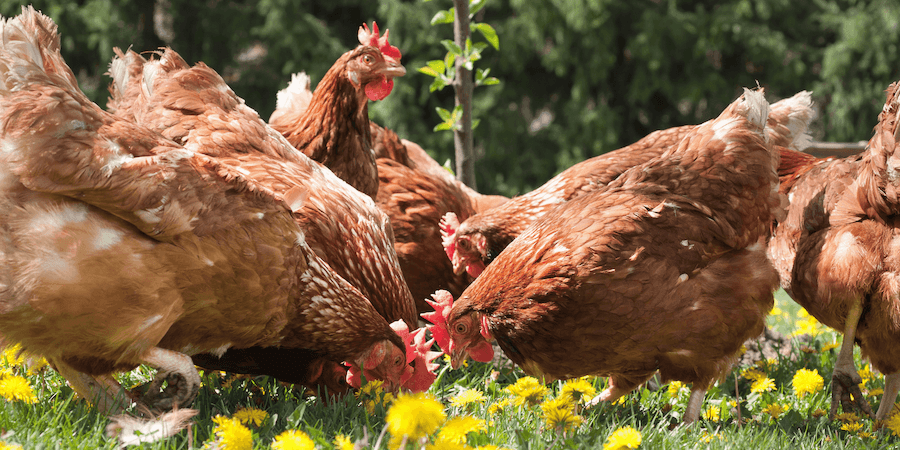
4 – Organic
Verdict: SUPPORT WHEN PASTURE-RAISED
- Organic refers mostly to the diet fed to the chickens.
- Organic chickens are not caged. Typically, they abide to free-range or pasture-raised practices, depending on the farm.
- They will have access to the outdoors, although if they’re free-range, this could mean just a small opening in the wall (a “pop hole” or even just a small porch).
- Their diet must be organic, free of synthetic pesticides, genetic engineering, and ionizing radiation.
- Must have a natural molting process (shedding their older feathers)
5 – Hormone-Free
Verdict: IGNORE – This is a misleading marketing term.
- The USDA doesn’t allow the use of supplemental or artificial hormones in egg production, so all eggs are hormone-free.
6 – Antibiotic-Free
Verdict: SUPPORT
- This means that the farmer did not use antibiotics in the hen’s feed or water during growing periods or when the hen was laying eggs.
- Organic eggs are antibiotic-free.
7 – Farm-fresh
Verdict: IGNORE – This is a misleading marketing term.
- This is a marketing term that isn’t regulated. There isn’t much meaning to “farm-fresh.”
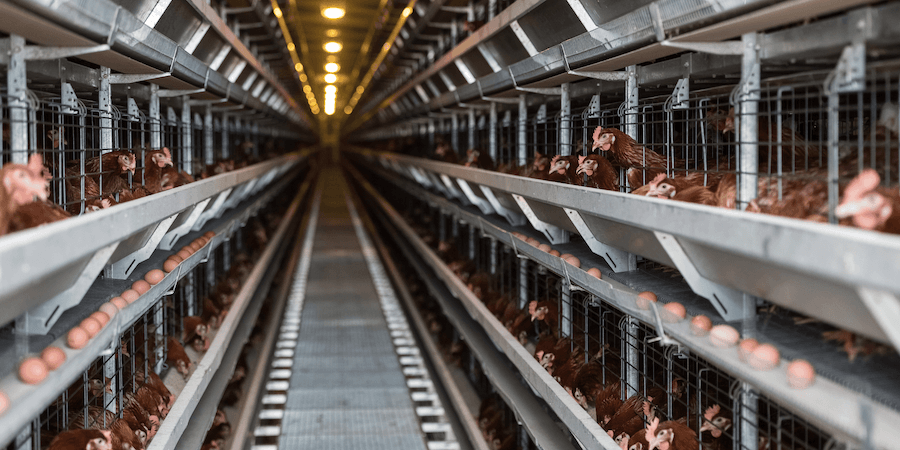
8 – Local
Verdict: SUPPORT WHEN PASTURE-RAISED
- Local eggs must originate under 400 miles from the processing facility.
- Eggs produced locally are better for the environment.
- Get to know your local farmer and how they’re caring for their laying hens.
9 – Vegetarian-Fed
Verdict: AVOID
- Chickens are omnivores, meaning they should be foraging on grass, worms, bugs, grubs, etc…
- Vegetarian-fed chickens are usually fed genetically modified corn – this should be avoided at all costs! This is not a natural diet for a chicken.
- Chickens can even engage in cannibalism if they’re deprived of an omnivorous diet.
10 – Grass-fed
Verdict: IGNORE – This is a misleading marketing term.
- There’s no legal definition for “grass-fed” hens by the USDA
- This just means that laying hens are fed grass, either partially or completely.
- If they’re only eating grass, this can be harmful to the health of the hen since they would be vegetarian-fed.
- Pasture-raised hens are naturally partially grass-fed, but they also forage on other things like bugs.
11 – Omega-3 Enriched
Verdict: AVOID
- Omega-3 enriched eggs are typically made by feeding hens flaxseed or fish oil, which aren’t naturally found in a chicken’s diet. This isn’t food that they would naturally be eating.
- Eggs typically already have high levels of Omega-3s, so this is more of a marketing term that’s not necessary
12 – Fertile
Verdict: IGNORE – There is no difference nutritionally.
- Hens don’t need a rooster to lay eggs, but if they mated, the eggs could potentially develop into chicks
- There’s no nutritional difference between fertile and non-fertile eggs

13 – All-Natural
Verdict: IGNORE – This is a misleading marketing term.
- This marketing term doesn’t mean much.
- Cannot contain any added colors or artificial ingredients, according to the USDA
- Most raw eggs would be considered “natural”
14 – Kosher
Verdict: IGNORE – unless you must abide by a Kosher diet. There is no difference nutritionally.
- Eggs are not considered kosher if they have cracked shells or blood spots
15 – Non-GMO
Verdict: AVOID – Opt for organic which is also free of GMOs
- This just means that laying hens weren’t fed genetically modified feed.
- It doesn’t explain anything about the treatment or health of the animal.
- To learn more about genetically modified foods, check out: 13 Pros And Cons Of GMOs (Backed By Evidence)
16 – Humanely Raised
Verdict: IGNORE – Unless it’s pasture-raised and certified by a 3rd-party.
- This term is not regulated by the USDA. Unless it is stamped with a seal from a 3rd-party certification program, this term means nothing.
- Can be certified by Global Animal Partnership, Certified Humane, Food Alliance, and American Humane, etc… Each certification has different standards. It’s best to review these standards on the Humane Society of the United States Egg chart here.
- Note that all humanely-raised eggs are not automatically pasture-raised or organic.
Other claims like “happy hens” and “animal-friendly” are completely meaningless. Don’t fall victim to deceptive marketing, even the luscious green grass images sometimes on the carton labels.
Opt for pasture-raised, organic, local eggs whenever possible.
Brown Or White Eggs – What’s Better?
Many people online believe that brown eggs are “healthier” than white eggs. It’s confusing, I know! Let’s bust that myth. The nutritional value or flavor of an egg is not impacted by its color. Frankly, it’s only a difference in genetics. Different breeds of laying hens will have different color eggs, ranging from brown to white, blue, pink, or speckles galore!
Fun fact: all eggs start out as white. Most of them will match the color of the chicken’s ear lobes! Who knew?!
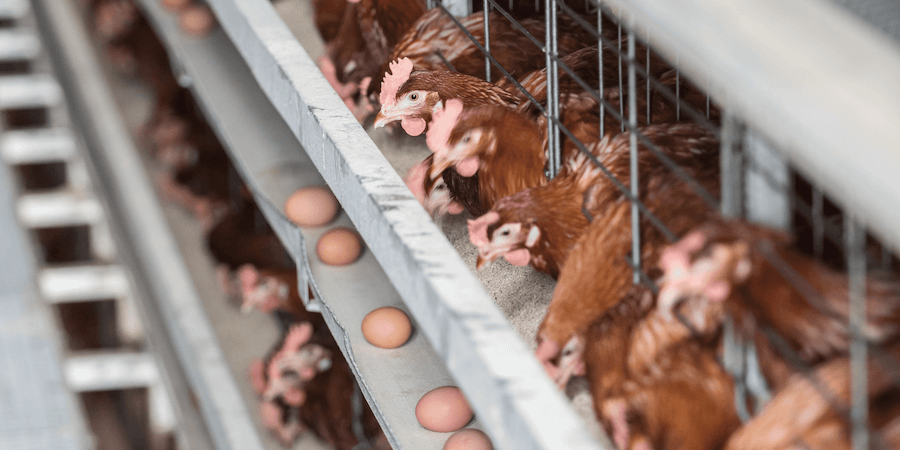
Are White Eggs Bleached?
No, white eggs are not typically bleached. While white eggs are cleaned and washed in the United States, their bright white pigment is made naturally, depending on the specific breed of laying hen.
Yellow Vs. Orange Yolks
Many organic pasture-raised eggs will have a deep orange yolk color. It’s usually a misconception that the more orange the yolk, the better (I used to think the same!). Typically, the yolk color is dependent on the chicken’s diet. For this reason, pasture-raised eggs typically have darker more pigmented yolks, since they have access to live vegetation.
Some farmers will even feed their chickens marigolds, turmeric, or paprika in order to make their egg yolks a brighter orange. [11] While egg yolk and shell quality oftentimes reflect the health of the chickens, don’t rely solely on the egg yolk color.
Myth: the egg yolk doesn’t have to be bright orange to be nutritious.
Egg Grades
Egg grading is a process used to determine the quality of an egg. It involves evaluating various factors such as the egg’s size, shell quality, and freshness to assign it a grade based on industry standards.
Let’s dive into the differences:
Grade AA
- Grade AA eggs are the highest grade
- They typically have the most nutritional value
- Egg whites are usually thick and firm
- Egg yolks are round
- They typically have strong shells with the classic oval-shape
- These types of eggs are ideal for all kinds of cooking, especially frying and poaching
Grade A
- Grade A is a step down from AA, mostly because the egg whites are less firm
- These don’t have structural issues, just like AA grade
Grade B
- Grade B eggs are the lowest quality
- Egg whites are runny
- Egg yolks are flatter – not as round
- Typically, Grade B egg shells can have abnormalities, like bumpy shells, blood rings, staining, embryo chicks, and more.
- Usually sold as frozen or freeze-dried egg products
Check Out The In On Around Shop
Do Younger Chickens Have Thicker Shells?
No, younger chickens do not necessarily have thicker shells. In fact, shell thickness is more dependent on the breed of the chicken and its nutrition than its age. Some breeds are known for producing eggs with thicker shells, while others have thinner shells. Additionally, a chicken’s diet can also affect the thickness of its eggs’ shells. A diet that is deficient in certain nutrients, such as calcium, can result in weaker and thinner eggshells.
Healthy chickens lay healthy eggs. Focus on quality.
The Best Eggs To Buy
When shopping for eggs, look for the following:
- Pasture-raised – ideally from your local farmer’s market
- Get to know your local farmers to understand what farming practices they follow
- You do NOT want eggs from vegetarian-fed hens
- Organic
- Look for USDA-certified eggs
- Score 5 or 4 eggs from The Cornucopia Institute’s Egg Scorecard
- This is a GREAT resource
- They use extensive criteria to analyze egg farmers in order to rank the best of the best.
- Their scorecard is updated on an annual basis for the most accurate ratings.
- Eggs rated a 5 are typically more difficult to find, but they’re the highest quality.
- 5-star brand example: Happy Hens Truly Outdoors
- 4-star brand examples: Vital Farms Restorative Organic Eggs, Pete and Gerry’s Organic Eggs
- Certified Humane (HFAC)
Free-range can be better than conventional eggs, however, they’re certainly not my first (or second) choice. Cage-free would follow.
Important note: a group of consumers filed a class-action lawsuit against the popular egg brand Vital Farms for using inhumane farming practices and misleading consumers about their pasture-raised practices. [12, 13] This class action is ongoing and the claims haven’t been confirmed, so take it with a grain of salt.
Final Thoughts – Best Eggs To Buy
Laying hens are living, breathing, sentient beings who deserve respect. They even outperform dogs & cats on most intelligence metrics! Not all eggs are created equal. Look for pasture-raised, organic, local eggs to find the highest-quality and most humane options. Get to know your local farmer and understand their practices for yourself. Have an egg-straordinary meal!
⬇ Pin this “Best Eggs To Buy” pic on Pinterest for future reference! ⬇
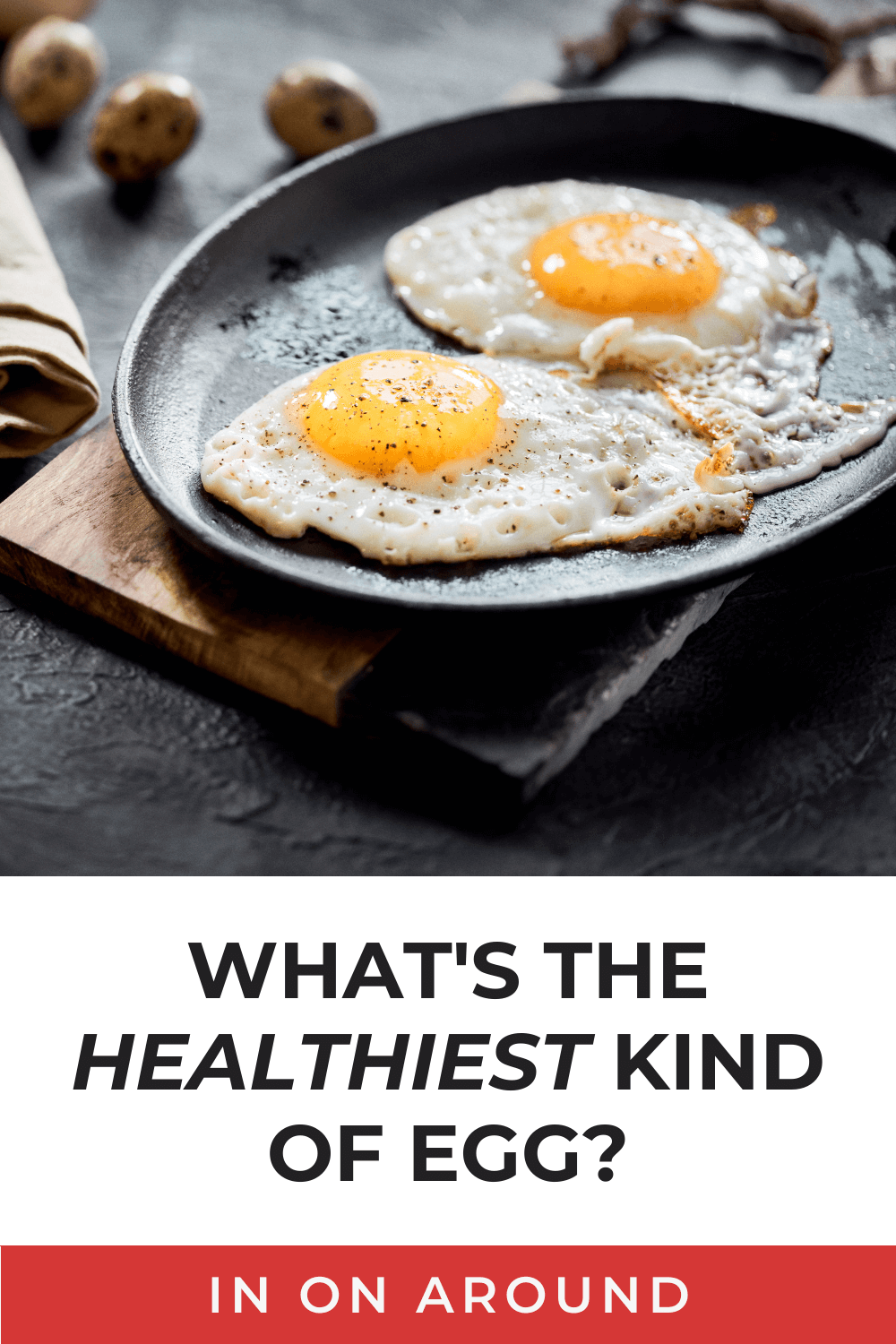
Frequently Asked Questions – Best Eggs To Buy
Click on the below FAQs to learn more about reputable sources for eggs, shell quality, taste, size, shell thickness, healthy chickens, and more.
Which type of eggs are considered the healthiest?
What is the difference between white and brown eggs, and is one better than the other?
Are free-range eggs better than conventionally-raised eggs?
Are White Eggs Bleached?
What kind of eggs do you buy?
If you have egg-stra thoughts and key takeaways, let me know in the comments below!
You can watch our web story here.
xoxo,

Want to read more? Check out my other articles here!
Other references on Best Eggs To Buy: Cleveland Clinic, Doctor Kiltz, FreshORR Family Farms, USDA, Huffpost, PSU, Farm Sanctuary, The Wellnest, Mother Earth News, Well Be, ABC, USDA FAQ, Taste Of Home, Livestrong, Bon Appetit, Weston A Price Foundation, Mamavation, Eating Made Easy, FlavCity, Appropriate Omnivore, Cornucopia, Better Homes & Gardens, Camille Styles, The Field, Harvard, United Egg Producers, FoodDive, Fresh Eggs Daily, EWG, Humane Society
Copyright In On Around LLC 2023 ©. The statements made on this website have not been evaluated by the FDA (U.S. Food & Drug Administration). They are not intended to diagnose, treat, cure, or prevent any disease. The information provided by this website should not be used as individual medical advice and you should always consult your doctor for individual recommendations and treatment. The information contained in this site is provided on an “as is” basis. Related to this site, there are no guarantees of completeness, accuracy, usefulness, or timeliness. In On Around LLC assumes no responsibility or liability for any errors or omissions in the content of this site.



